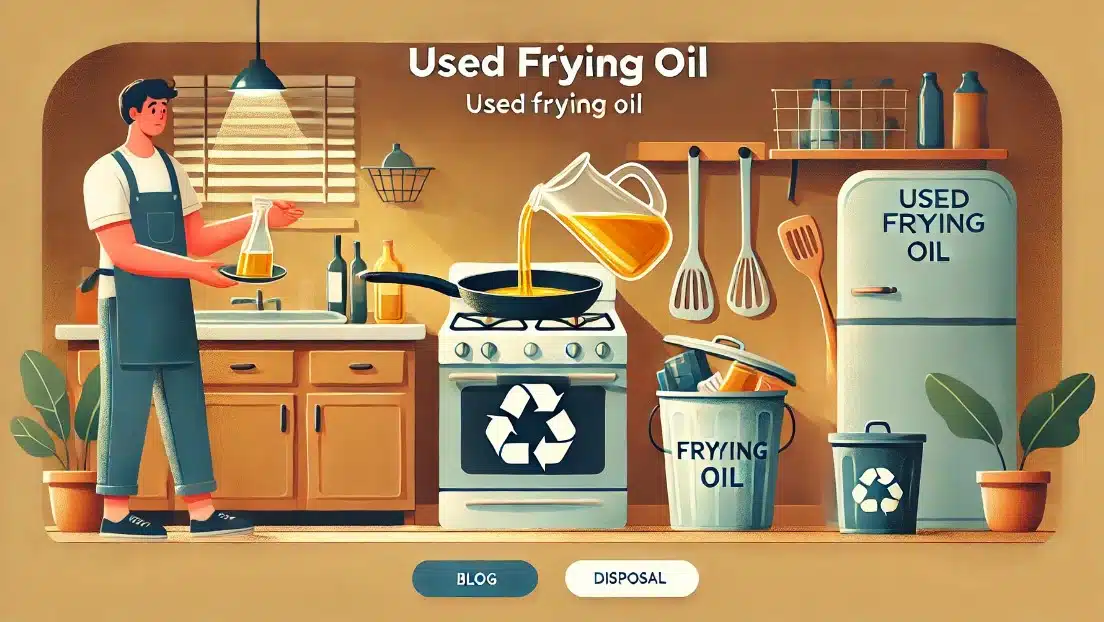Have you ever finished cooking a delicious meal and found yourself staring at a pan full of used frying oil, wondering what to do with it? If you’ve been tempted to pour it down the drain for a quick and easy solution, you’re not alone. However, this common practice can lead to serious consequences for both your home and the environment.
In this comprehensive guide, we’ll explore why pouring frying oil down the drain is a big no-no, and provide you with safe, practical, and eco-friendly alternatives for disposing of your used cooking oil. From simple household methods to creative recycling options, we’ve got you covered. By the end of this post, you’ll be equipped with the knowledge to handle your used frying oil responsibly, protecting your plumbing and the planet in the process.
Let’s dive in and discover the right way to bid farewell to your used cooking oil!
One of the most common mistakes people make when disposing of cooking oil is pouring it down the drain. While it might seem like an easy solution, it can lead to significant issues for both your home and the environment.
Oil and grease can cause severe plumbing problems. When you pour oil down the sink, it doesn’t just disappear. As it cools, the oil solidifies and clings to the inside of your pipes. Over time, this can lead to clogged drains, slow water flow, and even total blockages that require costly repairs.
Moreover, oil doesn’t break down in water. Instead, it forms a layer on top, making it harder for wastewater treatment plants to do their job. This can cause backups in your plumbing and further damage to sewage systems.
Beyond harming your pipes, pouring oil down the drain is also bad for the environment. Once oil enters the sewage system, it can make its way into rivers, lakes, and oceans. In waterways, oil can create a film on the surface, blocking oxygen from reaching marine life. This leads to harmful consequences for aquatic ecosystems, including fish and other wildlife.
By properly discarding frying oil, you help prevent pollution and protect local ecosystems from unnecessary damage.
Now that you know why improper disposal is dangerous, let’s explore the best methods for how to discard frying oil in a safe and eco-friendly manner.
One of the simplest ways to dispose of frying oil is to let it cool and solidify before throwing it away. Follow these steps:
This method is simple and effective for small amounts of frying oil.
If the oil is still relatively clean, you can reuse it for future frying sessions. Here’s how to reuse frying oil safely:
Reusing oil can save you money and reduce waste, but it’s essential to monitor the quality of the oil with each use.
For larger amounts of oil, or when you can’t reuse it, you can safely dispose of it by sealing it in a container. Here’s the step-by-step process:
This method ensures that the oil won’t leak into your trash or harm the environment.
If you’re looking for an eco-friendly way to discard large amounts of frying oil, consider recycling it. Many recycling centers and waste disposal facilities accept used cooking oil, which can be processed into biodiesel, a renewable energy source.
Recycling oil helps reduce waste and supports the production of renewable energy.
If you’re looking for even more environmentally friendly options, here are some creative ways to repurpose your used cooking oil.
For small amounts of vegetable oil, composting may be an option. While not all compost systems can handle oil, some allow small quantities of used oil to be mixed in with organic matter.
Composting oil is a great way to return nutrients to the soil, but it’s only suitable for small amounts of vegetable-based oils.
Many communities have local businesses or organizations that accept used oil for recycling. Restaurants, for example, often participate in oil recycling programs, so it’s worth asking if they can accept small amounts of oil from households.
You can also contact local animal shelters, farms, or other organizations that may use cooking oil for various purposes, such as animal feed or biofuel production.
For DIY enthusiasts, used cooking oil can be repurposed for a variety of household projects:
These DIY projects are a fun and creative way to minimize waste while putting used oil to good use.
Now that you know how to dispose of frying oil properly, let’s go over what not to do.
As mentioned earlier, never pour oil down the drain. It can clog pipes, damage plumbing, and contribute to environmental pollution. Always choose an alternative disposal method.
While it’s fine to throw away small amounts of oil, large quantities can cause issues in landfills. Always seal the oil in a container to prevent leaks and avoid throwing away excessive amounts at once.
Don’t mix liquid oil with regular trash unless it’s sealed in a container. Loose oil can create a mess, attract pests, and damage trash collection equipment. Always take the time to package the oil properly.
Properly disposing of frying oil is essential for protecting both your plumbing and the environment. By using safe methods like solidifying the oil, reusing it, or recycling it at a local facility, you can minimize waste and prevent damage. For eco-conscious individuals, alternatives like composting or repurposing oil for DIY projects offer additional ways to discard frying oil responsibly.
Next time you fry up a batch of your favorite food, remember these tips for safe disposal. Whether you’re discarding a small amount or dealing with larger quantities, these methods will help you manage used oil in an environmentally friendly way.
Have you tried any of these methods? Let us know in the comments below, and check out our other eco-friendly kitchen tips!
I bring over 9 years of dedicated plumbing experience to the table. As a seasoned professional in the plumbing industry, I've tackled a wide range of projects, from residential repairs to large-scale commercial installations.


As someone who does a lot of deep frying for family gatherings, I really want to address what this article missed about oil disposal. Sure, they covered the basics about letting it cool and using containers, but they didn’t mention one crucial thing: NEVER pour hot oil into plastic containers, even if they seem sturdy! I made this mistake once and ended up with a melted mess. Also, while they suggest mixing oil with cat litter for disposal, they should emphasize that this only works for small amounts – trying to absorb a whole deep fryer’s worth will just create a bigger mess. And here’s something I learned from experience: strain the oil through a coffee filter before storing it for reuse, it makes a huge difference in how many times you can reuse it. One last tip they overlooked: check with your local restaurants – many will let you add your used oil to their disposal tanks, which is way better than sending it to a landfill. Their point about not dumping it down drains is spot-on though – my plumber brother could tell you some horror stories about that!
This guide really opened my eyes about proper oil disposal. Been cooking for years but never knew about letting the oil cool completely in a metal container before transferring it – such a basic but important safety tip. The section about which local recycling centers accept cooking oil was super helpful. Also appreciate the tips about which containers are safe for disposal versus recycling.